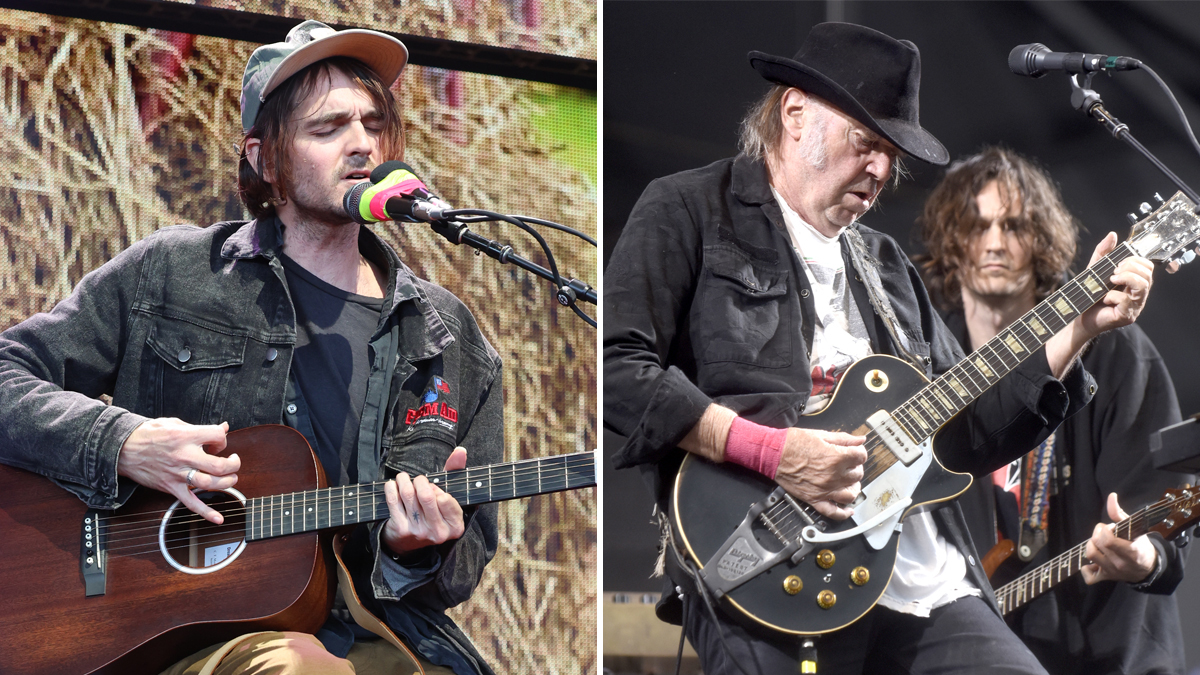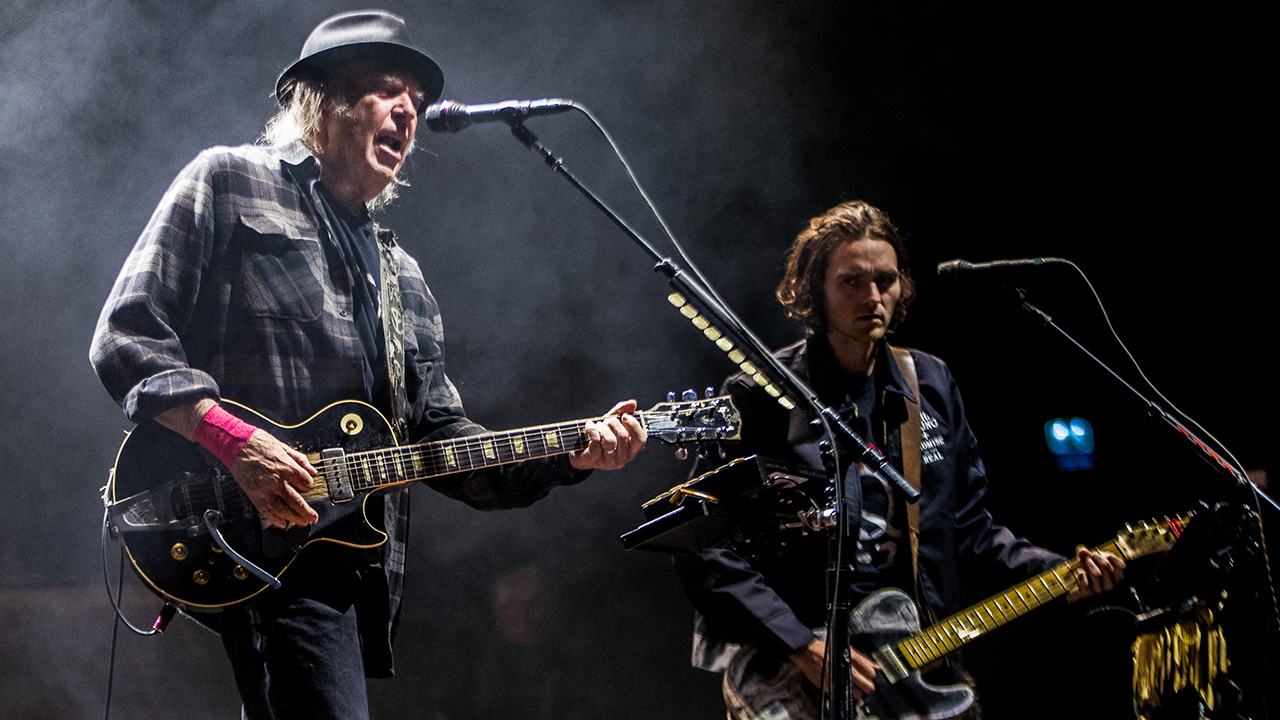
It’s no surprise that Micah Nelson grew up as a free thinker, given his dad is country renegade Willie Nelson. What’s more, he’s close friends with the ultimate anti-hero of guitar, Neil Young – and now, he’s a member of his iconic band, Crazy Horse.
What led the youngest of the Nelson clan to set aside his utterly abstract yet still guitar-driven project, Particle Kid, and take on the legendary parts of Danny Witten, Nils Lofgren, and Frank ‘Poncho’ Sampedro?
“In January of 2023, Neil called and asked if I’d like to join Crazy Horse,” Nelson tells Guitar World. “I was born in the Year of the Horse, so of course I said ‘yes!’ After I agreed, the first thing I thought was, ‘I’m gonna need a new amp.’ I wasn't sure what Neil wanted – I didn't know if he wanted me to be Nils, Poncho or Danny.”
The answer was simple: Young advised Nelson to “be true to the music”. Which makes sense, as the proverbial godfather of grunge has spent well over 50 years doing just that. “My approach has always been to complement whatever the music needs,” Nelson says. “But Neil has always challenged me to push myself beyond the norm in many situations, which became a big thing.”
One look at Willie Nelson’s battered Martin N-20 acoustic, Trigger, explains all you need to know about the rustic wisdom the elder musician has imparted to his children. Asked how he’s injected that soothsaying into his career, Micah says: “I’m sure I could write a song that sounds like Willie Nelson or Neil Young.
“I could deliberately be like, ‘I’m gonna rip off Neil Young right now,’ just like he ripped off Bob Dylan, and like my dad ripped off Django. I could do that all day, and there’s nothing wrong with that.’”
But he doesn’t believe that’s what would be going on. “We’re just borrowing timeless things and being passed down,” he argues. “So I’ll keep digging into similar patterns, and I’ll keep exploring myself. That's just part of being fractal. It’s all a part of me. My roots and lineage will remain, but where I take that remains to be seen.”
After you joined Crazy Horse, what sort of directive did Neil give you?
“He told me to stick to the records, which is great because it’s like being true to my heartbeat. Most of Crazy Horse has a groove and a feeling that’s so familiar. I’ve been filling the part of Danny, who was such a unique player. He and Neil invented grunge music.
“And on many of those early songs, many people think it’s Neil soloing, but it’s Danny. At first I thought I’d be covering more of Nils’s stuff, but that ultimately wasn’t the case.”
And that's because Nils ended up on tour with Neil, I assume. How did that shake out?
“Nils suddenly freed up to play with us because Bruce Springsteen – his regular gig – got sick. I ended up switching back and forth from guitar to piano. But it was fun because when we did the stuff from Tonight’s the Night, I was like, ‘Okay, cool. I can be Danny now.’
“I also had to focus on the Ben Keith stuff. That had me saying, ‘Great, now I have to do more homework and learn how to be another fucking irreplaceable genius!’”
What’s your rig like while on tour with Neil?
“Ted Kornblum, who runs Magnatone amps, has been very supportive of me. I’m a big fan of their Twilighter Stereo amps, and I use those a lot. I’ve used them in Particle Kid and I love the sound. I decided to use that amp.
“I was worried it was going to be too much – but Neil’s little Fender Deluxe is loud as fuck. That thing is tiny but mighty, and we have outstanding balance.”
And how about guitars?
“Poncho gave me a slide which worked great with my Fender Jazzmaster. I have the J Mascis signature model and I love it. There are songs like Everybody Knows This is Nowhere where I use my Gretsch 6120 Chet Atkins. It has great P-90 pickups that are custom-fitted for that guitar, and those also sound great on another of my favorite Neil songs, Running Dry (Requiem for the Rockets).”
I've also seen you out there with a Tele and a Melody Maker.
“Oh, yeah. I also have my Telecaster, which I use as a backup if I break any strings. It’s a relic version based on a ’54 Fender made by Nash with Lawler pickups. It’s a great-sounding guitar, and I sometimes like to put that in drop D tuning on songs like Cinnamon Girl.
“That aside, there’s Gandalf, which is my gray Gibson Melody Maker. It’s so light that it feels like a piece of driftwood. But the sound is fantastic, and it has this Bigsby knockoff that I installed myself. It’s been all over the world with me.”
Your dad must have taught you a lot; what have you learned from Neil?
“There are universal, timeless elements to certain types of music, you know? Neil’s is certainly noisier and thrasher than my dad’s. He’s so melodic; he has such a melodic sense.
“If you listen to Neil, there’s stuff that’s just fucking raging and so distorted. But despite that, the melodies are so beautiful. Neil and my dad both showed me that melodies are important and that being able to sing along to them is essential.
If you have a great song, you can strip away all the sound effects, focus on the melody, and still make something utterly engaging. That’s the foundation of the guitar
“I’ve always been drawn to melody and melodic sense. Neil’s phrasing is so excellent, but it’s weird – it's fucking bizarre and abstract. I see him as an expressionistic painter with the guitar. Even when he’s doing just a little, he’s still saying so much.
“If you have a great song, you can strip away all the sound effects, focus on the melody, and still make something utterly engaging. That’s the foundation of the guitar; it's the blood and muscle of the thing.”
And how do you view your dad’s playing?
“A lot of emotion lives within my dad’s playing. At a certain point, I saw that and found that I wanted to explore that. It might sound simple, but the emotion lives within the space he creates. Early on, I constantly experimented with sounds in my songwriting and got excited. And to a certain extent I still am.
“But I also realized that with space, if you have melody, it’s easier to connect. My dad was born in the ‘30s and came up in the ‘40s and ‘50s. He was deeply into Django Reinhardt and Roy Rogers, guys like that.”

Do you see a lot of your dad’s style within your own?
“I grew up in the ‘90s – I loved Sonic Youth and weird movies by David Lynch and Tim Burton. We come from different cultural backgrounds, so the way I go about interpreting those same root elements is different.
“But I listened to all the stuff my dad did, and I borrowed from that, too. Neither of us are the first to do it like that – but like my dad, I’ve interpreted it in my way, seen it through my lens of life, and put a twist on it.”
Having said that, where do you plan to take your guitar playing in the future?
“It’s hard to transcend; it’s hard to have emotion come through, and it’s hard to hear your soul. But that’s what I’m trying to get to: the source of my soul. Any time I love an artist, I will listen to all they do and learn what they love. That’s how I understand where they come from.”
Does that help you understand where you come from and where you’re going?
“Absolutely. I could take apart every one of my songs and be like, ‘Here’s a little Radiohead,’ and, ‘There’s a bit of Animal Collective.’ But I can also pick them apart and say, ‘There’s some Bob Dylan.’
“All the influences are there, and that’s the fun of what makes things what they are. Man, it’s just fun to explore. That type of thing is endless and will never stop, no matter what I’ve done or what I’m doing.”







